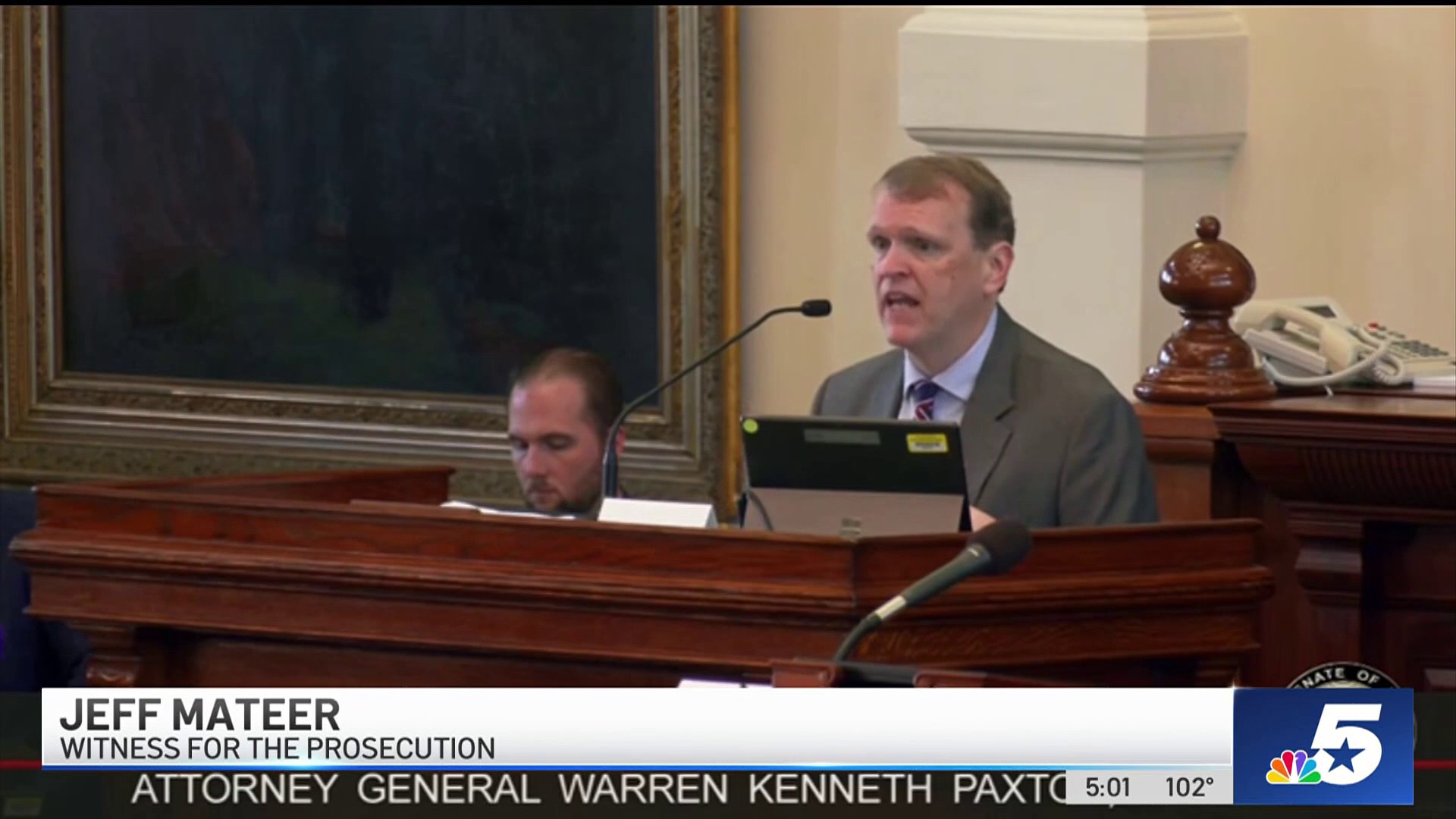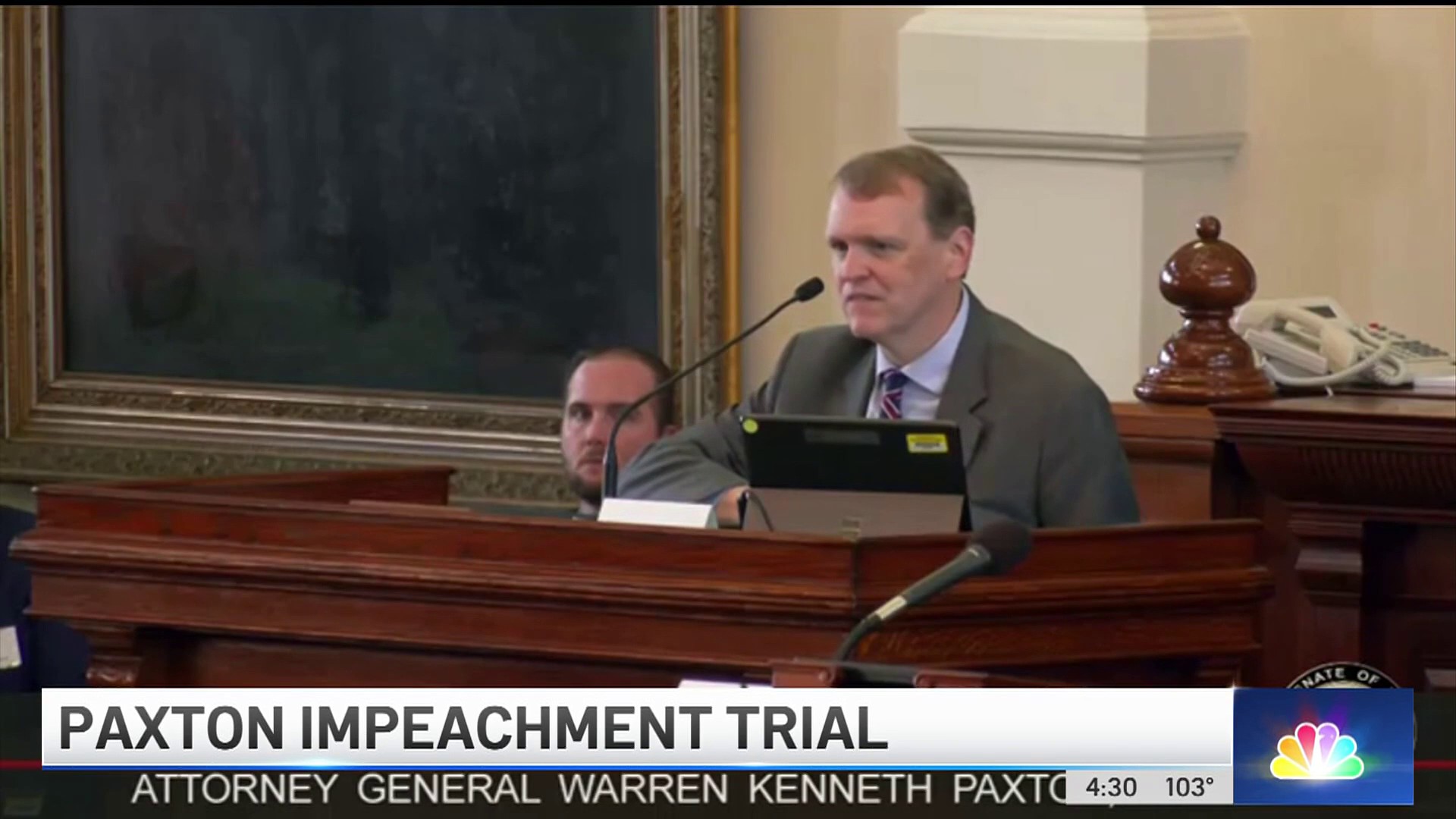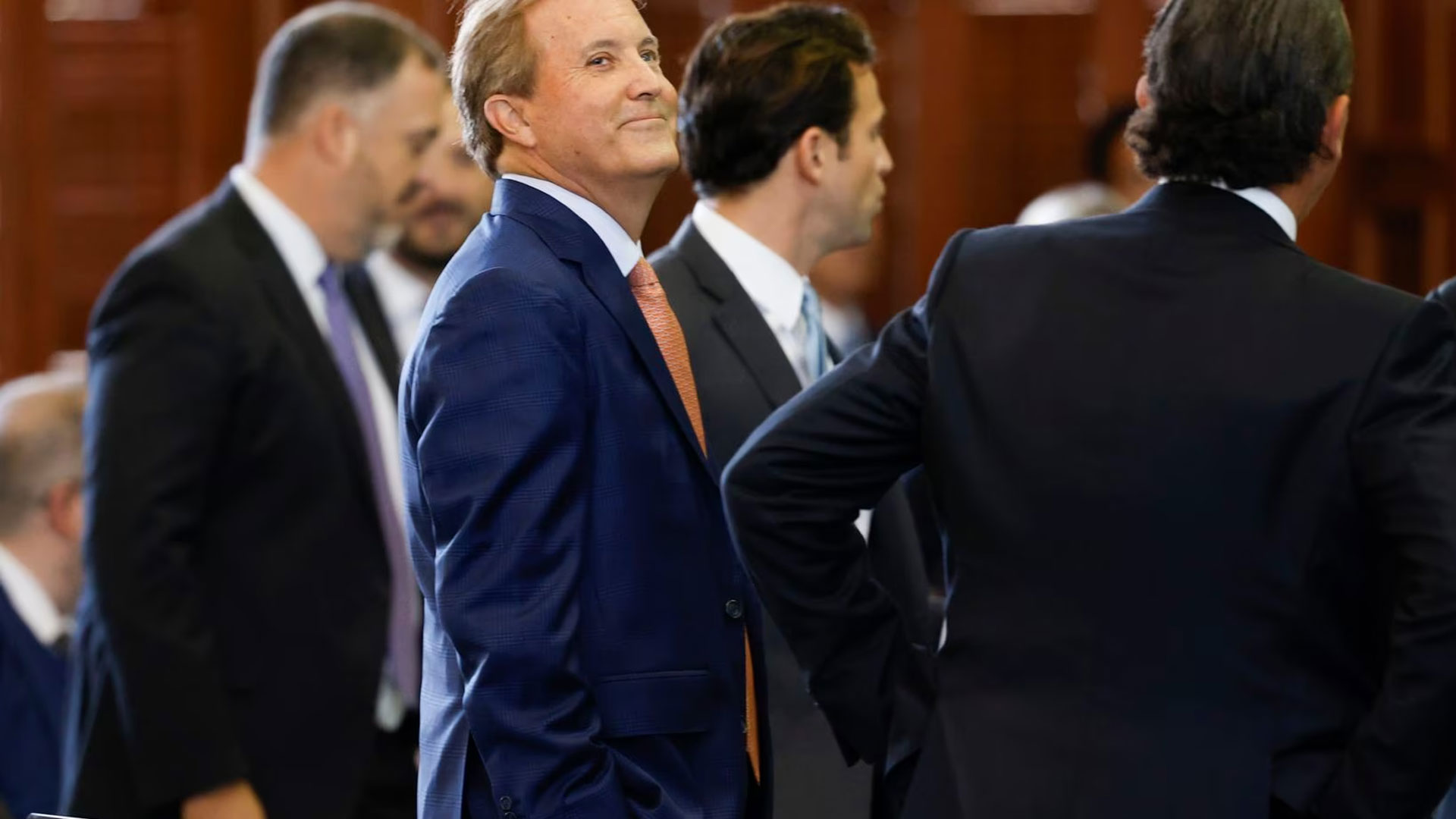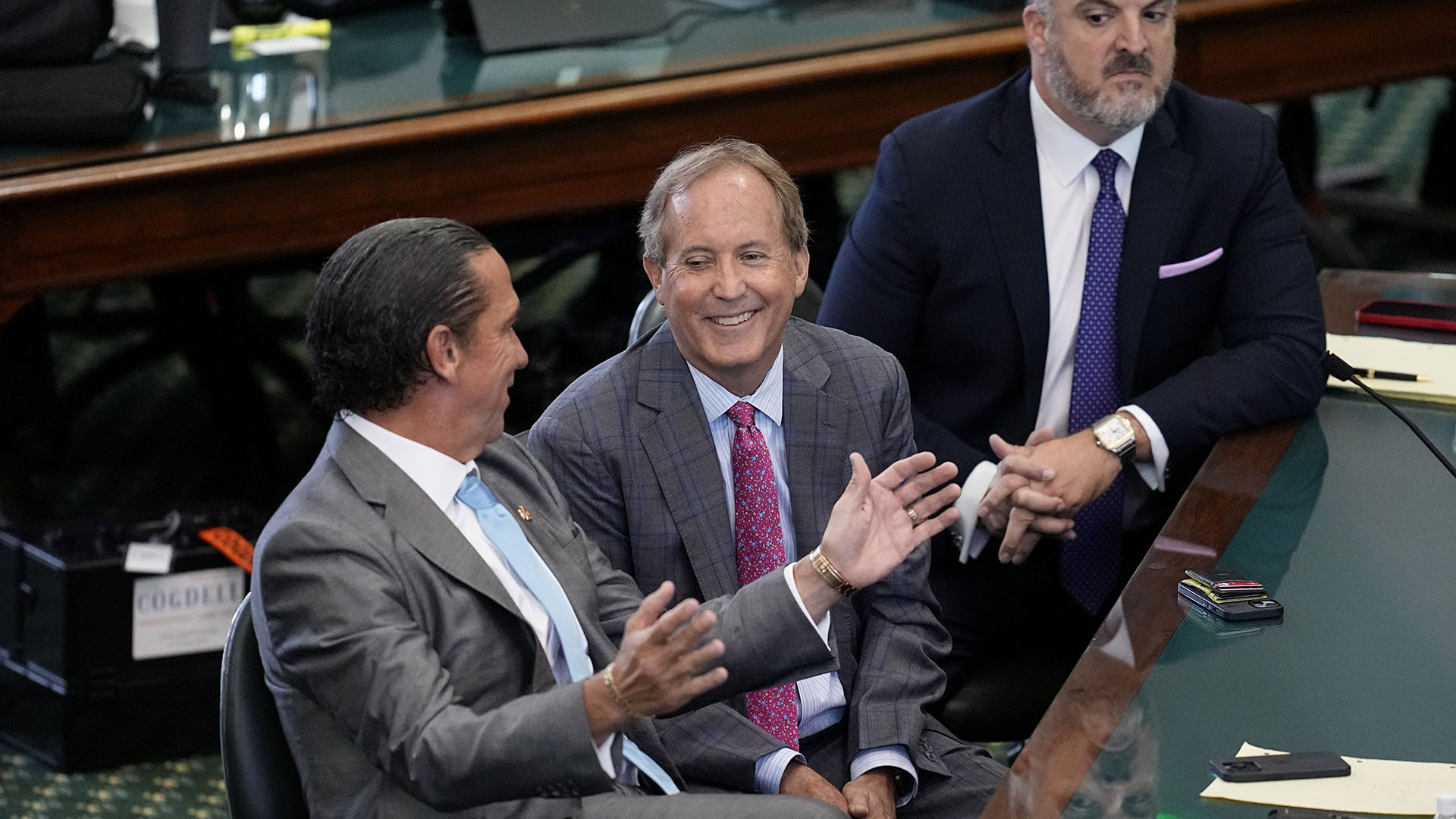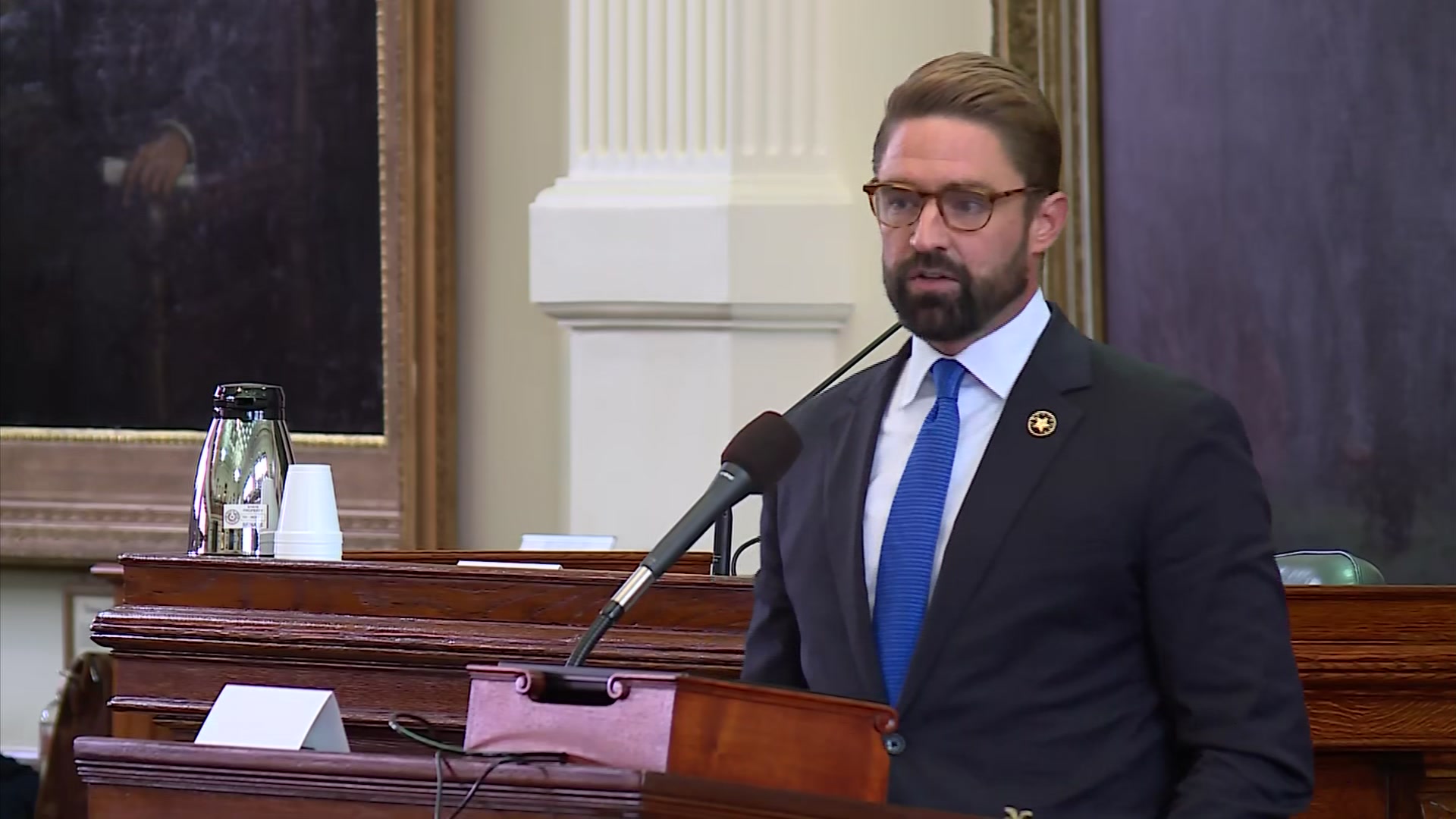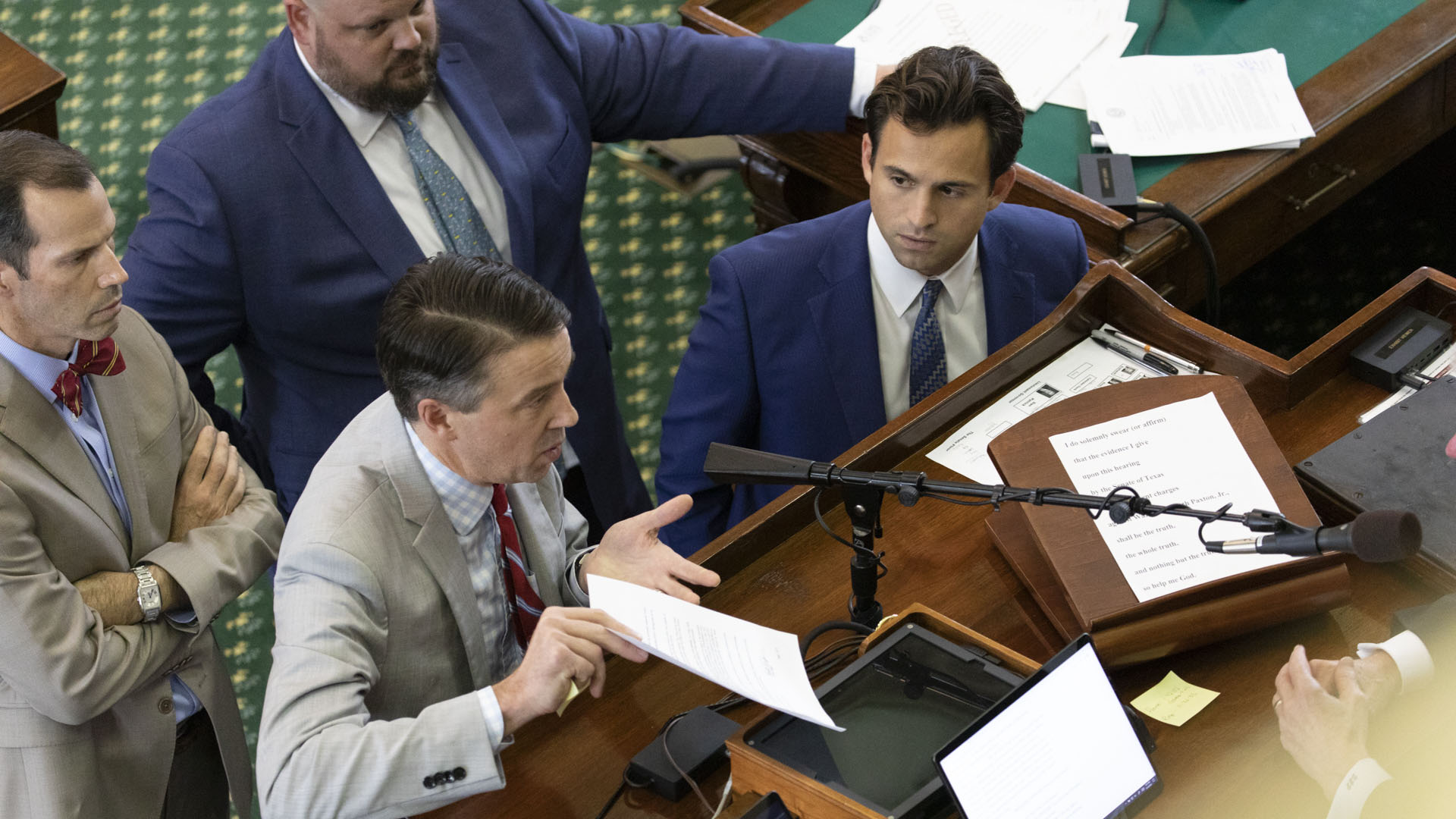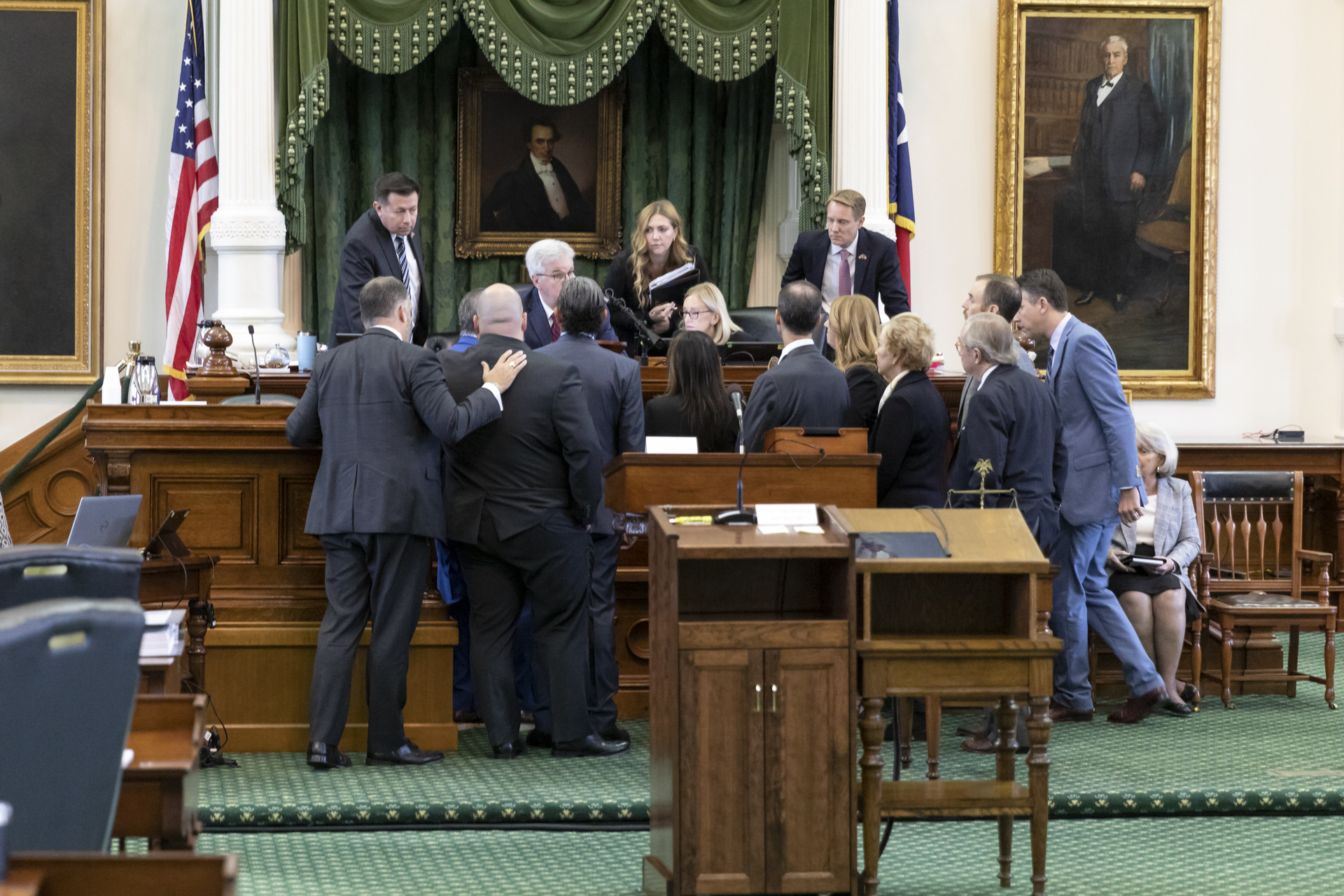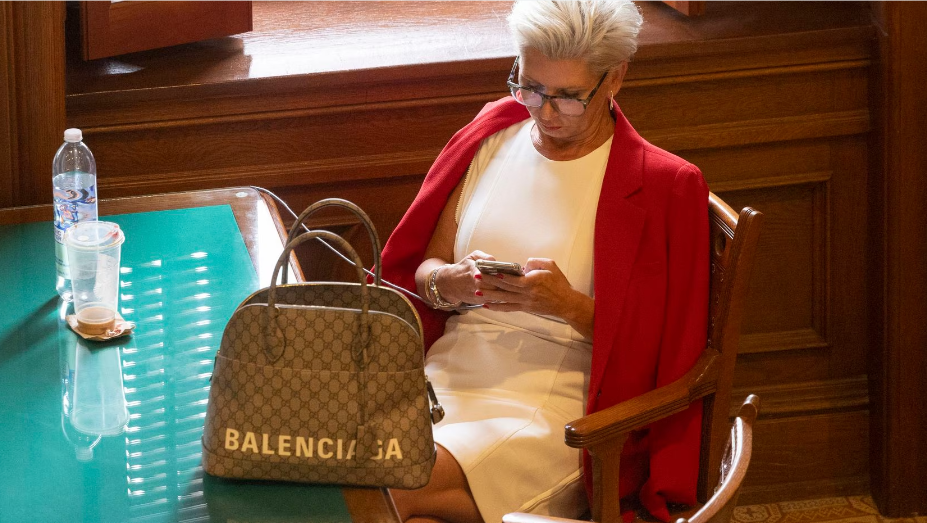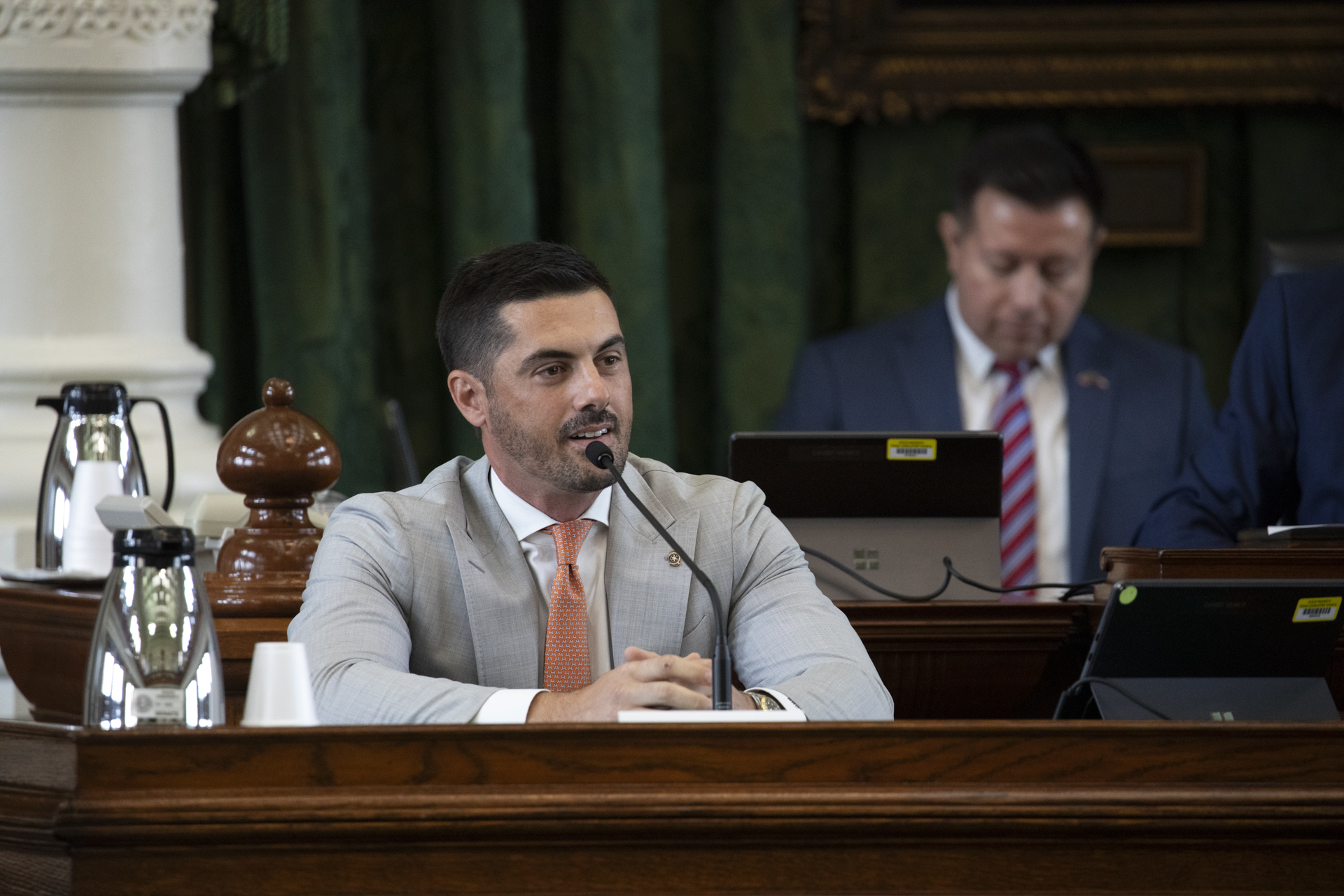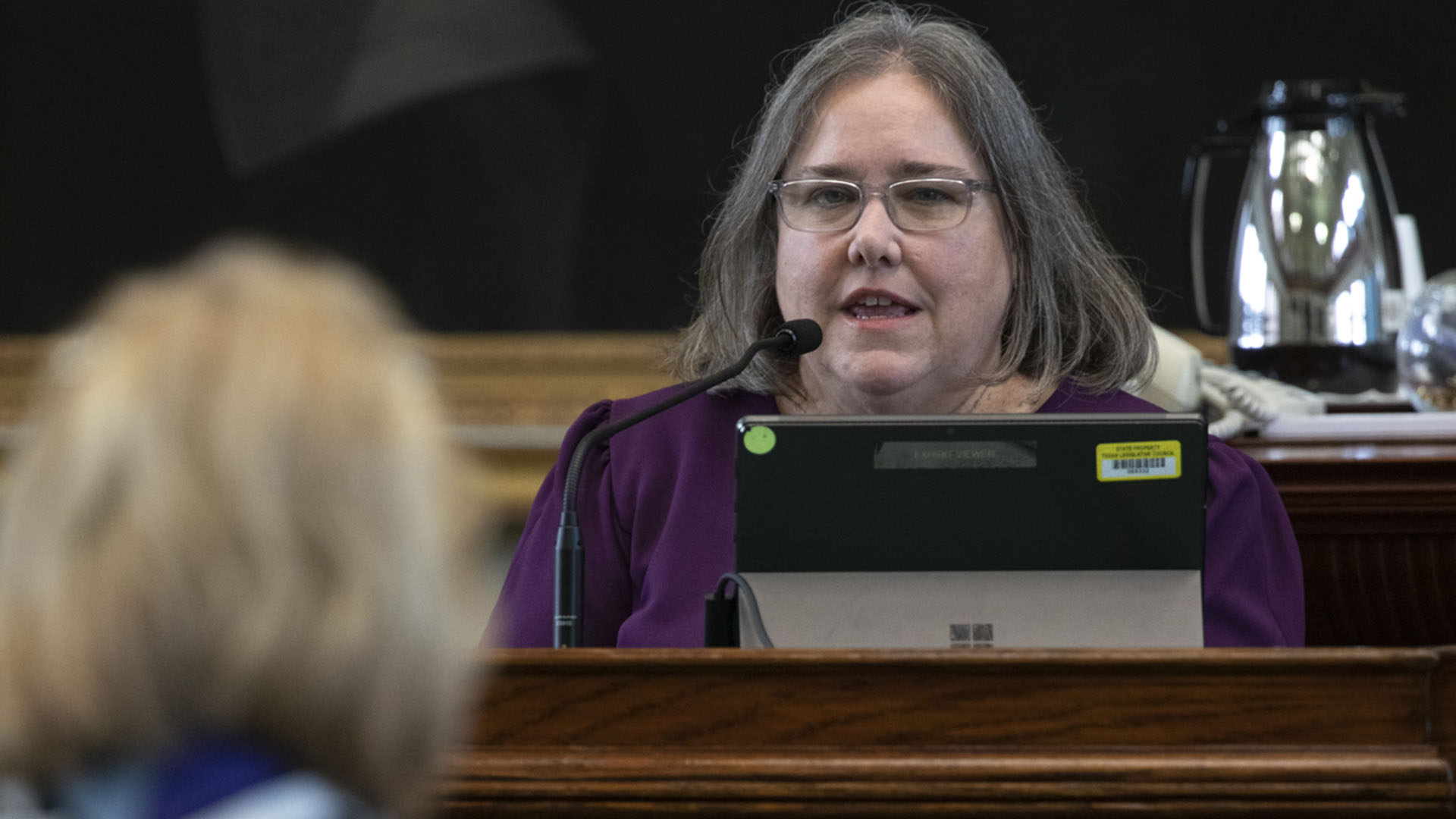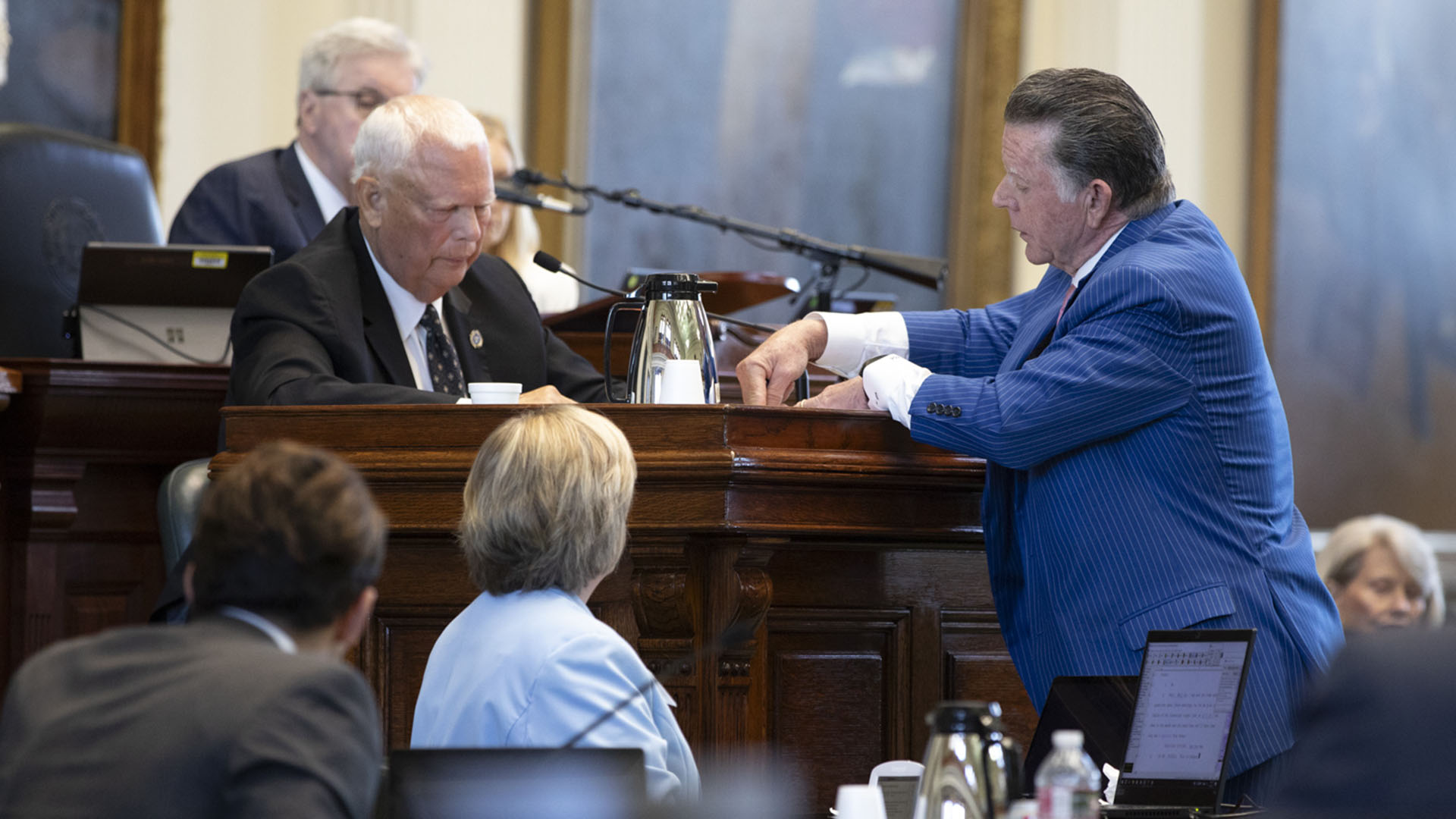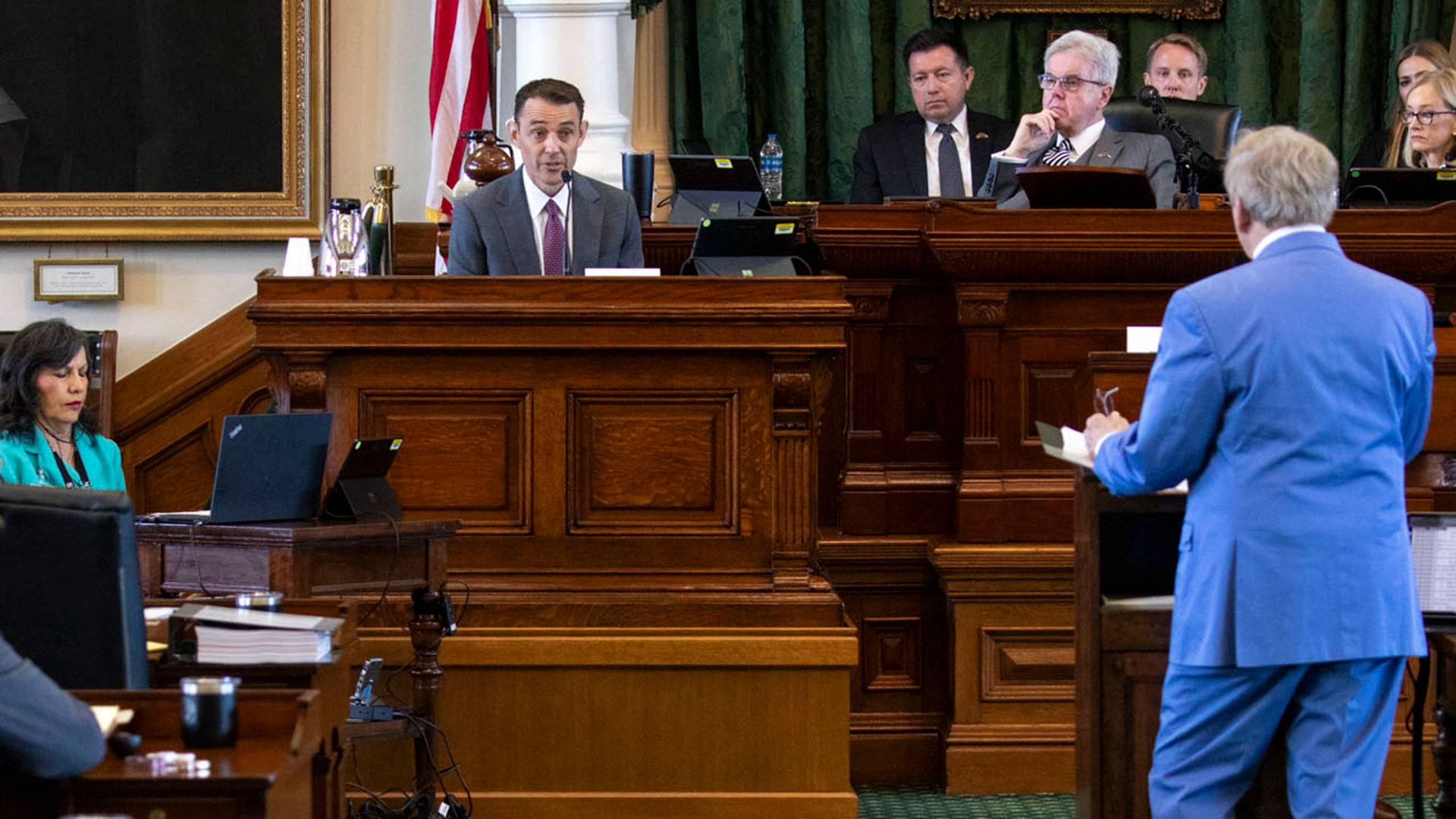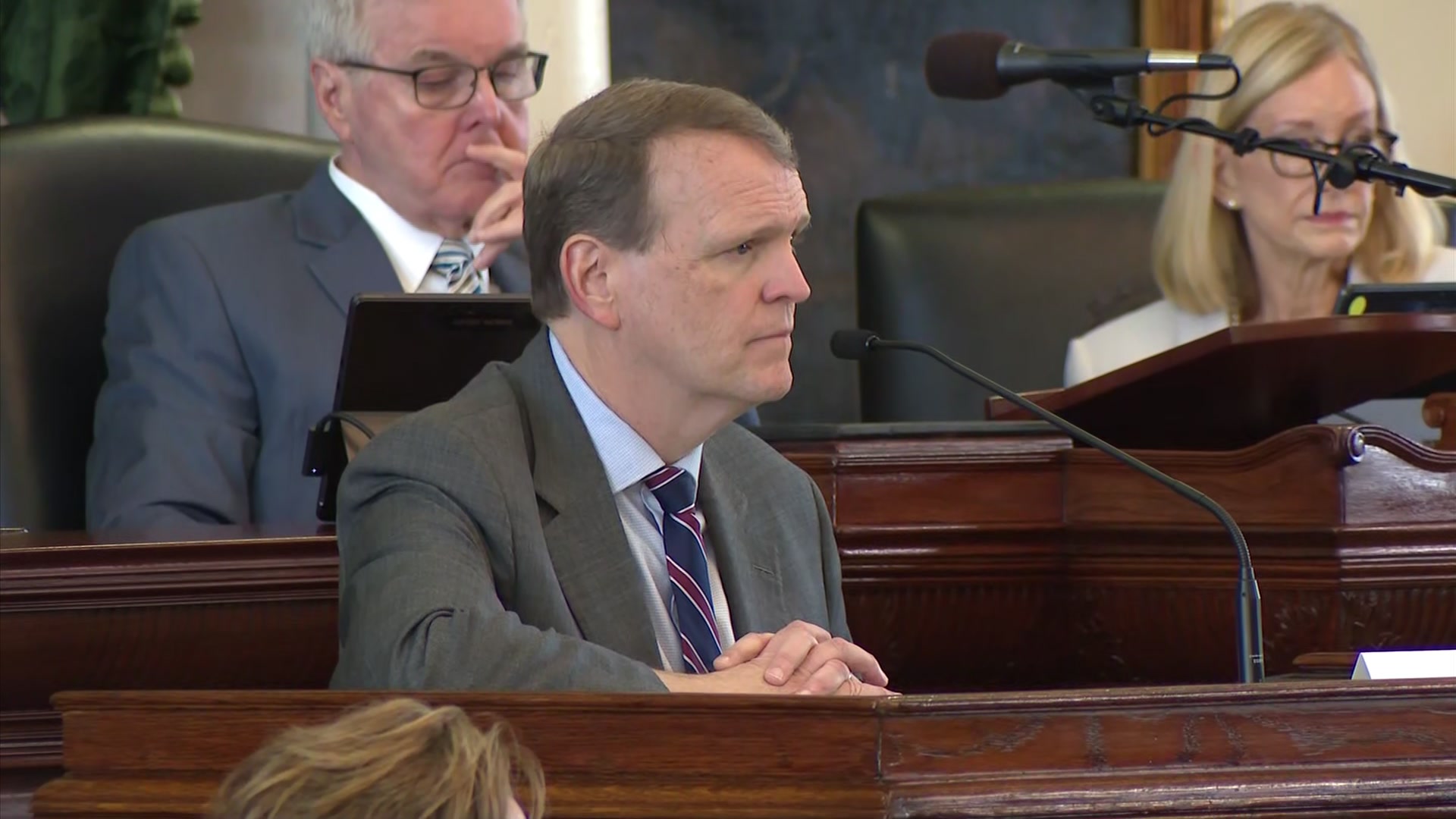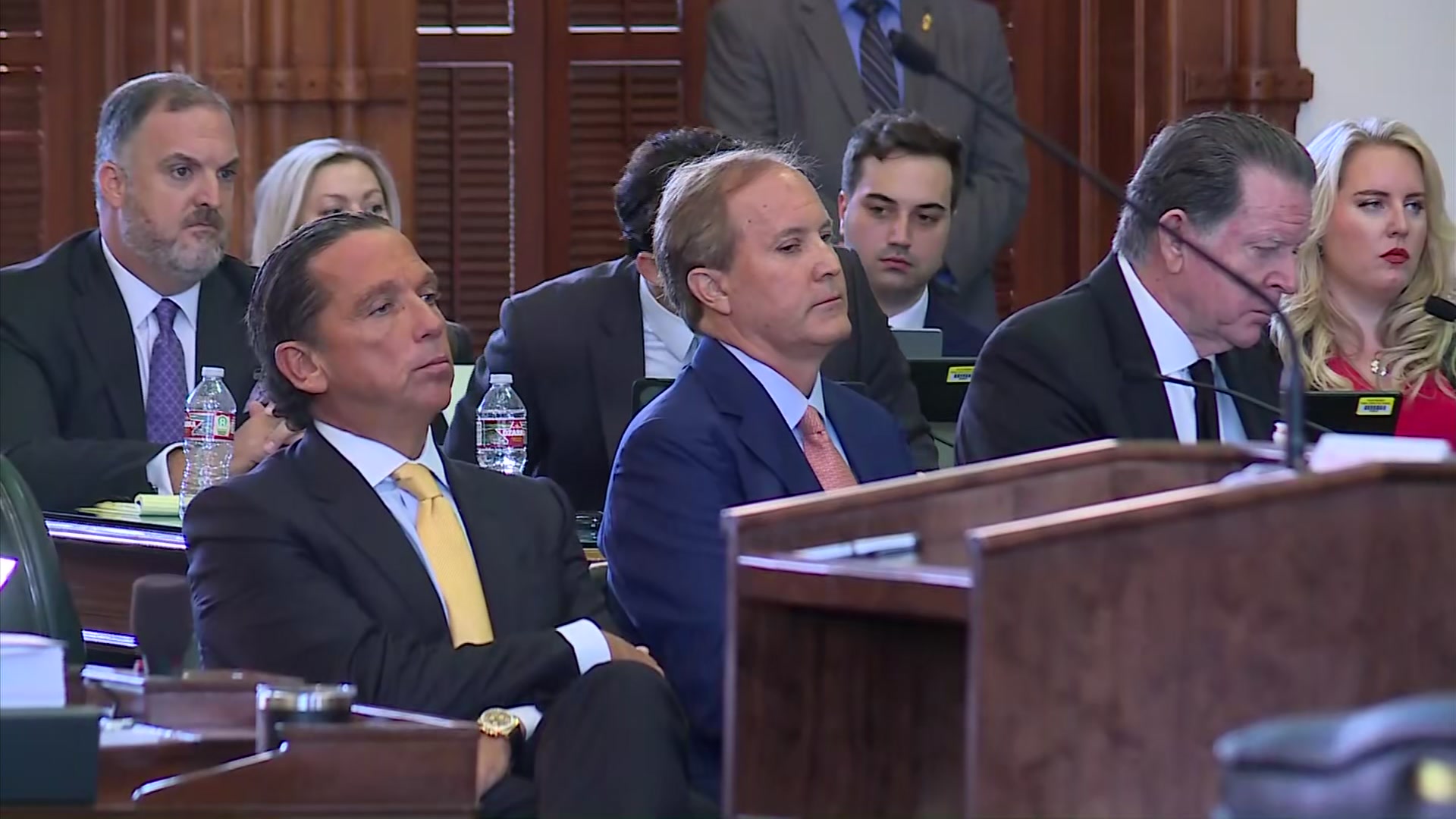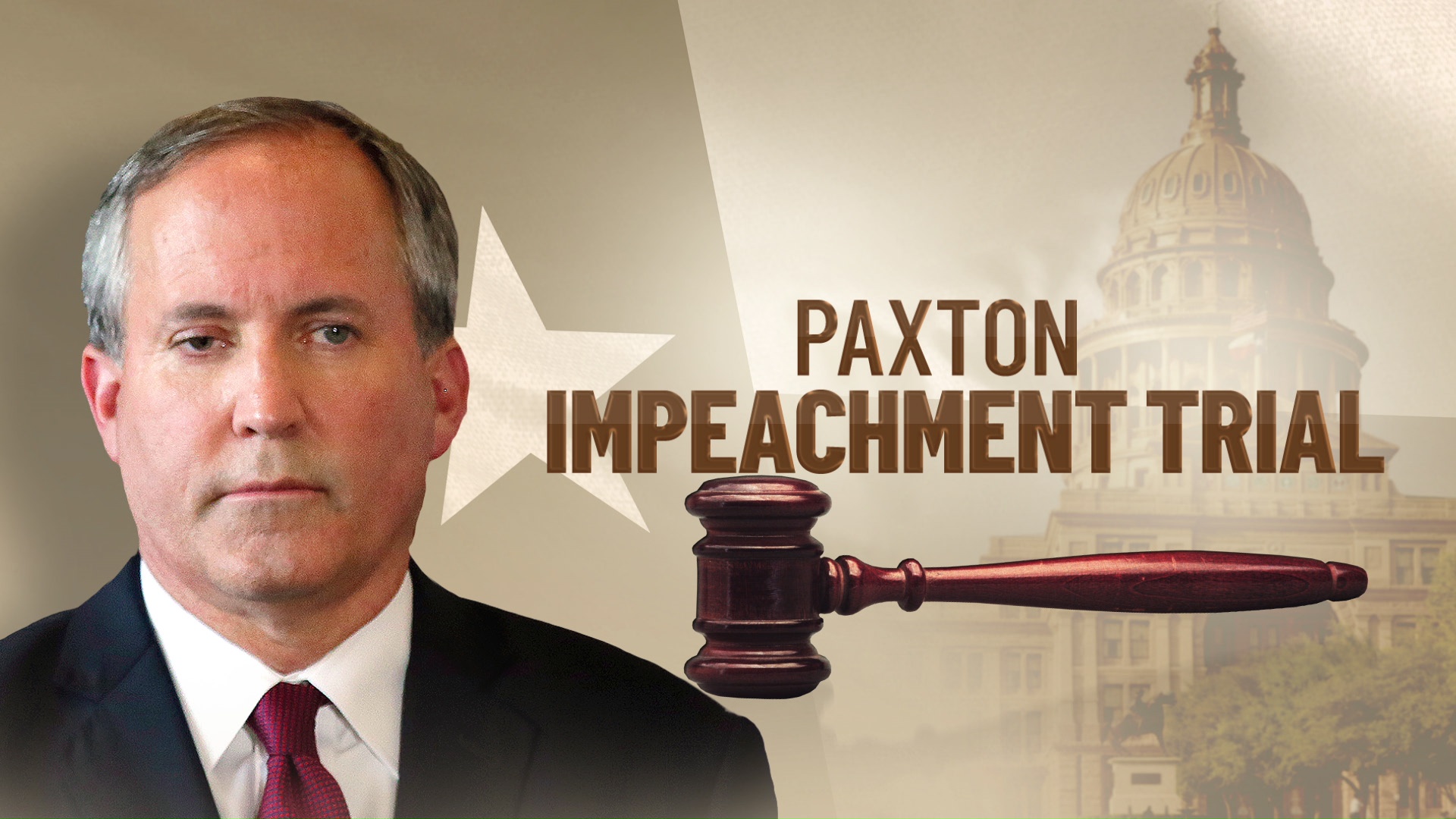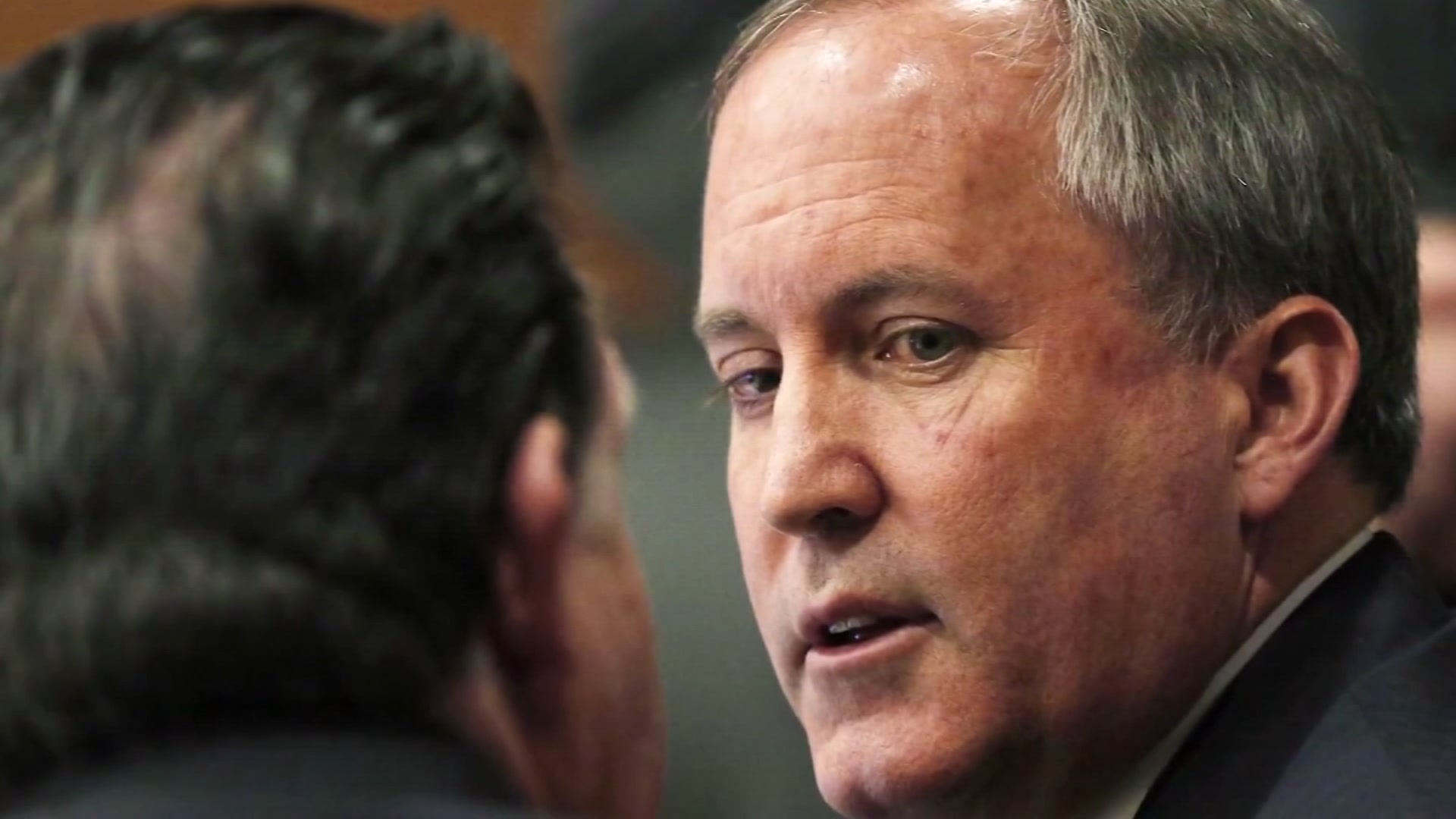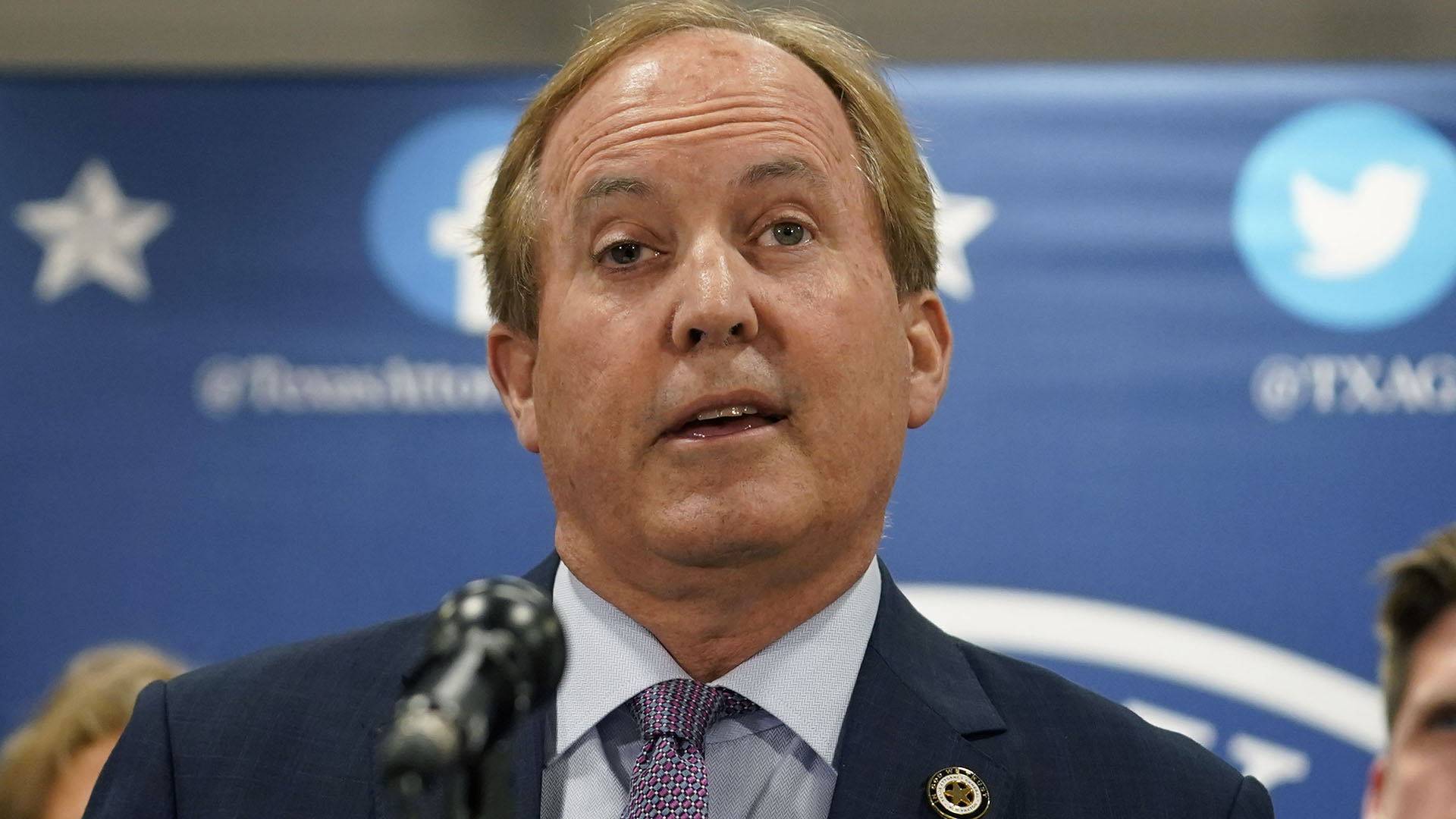The second day of the impeachment trial of suspended Republican Texas Attorney General Ken Paxton wrapped up late Wednesday afternoon after hours of testimony and tense cross-examination with whistleblowers.
On Wednesday, prosecutors wrapped up their questioning of former Paxton aide Jeff Mateer mid-morning before handing him off to the defense for cross-examination.
Part of the reason they have spent so much time on Mateer is his credentials. Mateer is a very conservative lawyer who now works for a religious liberty law firm but before that, he worked as Ken Paxton's first assistant attorney general.
In the summer of 2020, Mateer grew concerned about how Paxton was interfering in lawsuits involving now-indicted real estate developer Nate Paul. They grew more concerned when he hired an inexperienced lawyer to look into Paul's claims.
Get top local stories in DFW delivered to you every morning. >Sign up for NBC DFW's News Headlines newsletter.
At first, Mateer said he thought Paxton might be getting blackmailed but later believed the general was in on it and was helping out a friend in exchange for helping facilitate an admitted extramarital affair.
“It answered that ‘why’ question,” said Mateer.
Mateer testified about how he was surprised Paxton wanted an opinion on stopping foreclosure on one of Paul's businesses, using COVID lockdowns as a reason. Mateer said that approach was in contrast to the office's position, which in August 2020 has been about reopening the state and removing COVID restrictions.
KEN PAXTON IMPEACHMENT TRIAL
Reports from Day 2 of the impeachment trial.
"The opinion took the complete opposite view. It was like if Anthony Fauci had written it. It was shut down. I mean, it was, 'You can’t do outside foreclosure sales.' I remember coming back and talking to Mr. Bangert about, like, 'What? What was this? This is completely contrary,'" Mateer said.
Defense attorney Tony Buzbee tried to paint Mateer as an employee who went around his boss's back and even accused of him attempting to stage a coup to take over the office.
“You were staging a coup, weren’t you?” said Buzbee.
“Absolutely not,” Mateer replied.
Mateer ended up resigning from the attorney general's office over his concerns about Paxton's conduct, which he described as immoral, unethical and illegal.
After redirect and recross of Mateer, House managers called their second witness, Ryan Bangert who was deputy first assistant attorney general under Paxton.
Bangert was questioned for about two hours before the court recessed for the day. Bangert will return to the stand Thursday morning when the trial resumes at 9 a.m.
DAY 2 LIVE UPDATES
6:19 p.m., Patrick adjourns court until 9 a.m. Thursday morning.
6:18 p.m., Bangert said he had never experienced an interaction such as this with the attorney general, with such continued communication, as he did with the redrafting of the foreclosure opinion.
Bangert said the draft of the opinion was to originally be signed by Vasser but that he changed it to go out under his signature.
"At the end of the process, I had become very alarmed by the attorney general's behavior. I had promoted Ryan Vasser into that position myself and I felt a degree of responsibility to him. He was still building his career and my sense was, if something broke bad with this, I did not want it to tarnish his career."
6:11 p.m., Hardin asked Bangert about Paxton's conduct after the opinion was completed. "It was bizarre. He was acting like a man with a gun to his head. Anxious, desperate, urging me to get this out as quickly as humanly possible. I was very concerned," Bangert said, adding that Paxton said he wanted it done that weekend to help Texas homeowners.
6:09 p.m., "It was exceptionally uncharacteristic for the attorney general to be involved in an opinion like this," Bangert said. He said he assigned the draft to be rewritten by Ryan Vasser and that it was prepared, edited, and sent to Paxton that evening. After multiple discussions and changes, the opinion was completed after midnight.
6:08 p.m., Bangert said the draft of the opinion indicated that generally speaking foreclosures would be allowed to go forward. He said that afternoon the attorney general said that wasn't the answer that he wanted or that he was looking for and that Paxton said the opinion should be written in a way so that foreclosures don't go forward.
6:07 p.m. Because the agency had a position that Texas should be open for business, Bangert said closing those foreclosure events would have been contrary to the agency's position.
6:05 p.m., Bangert said they were asked to determine whether the governor's orders would preclude foreclosure sales from taking place. He said because they generally happen in person on a particular day of the month, there was a question about whether during COVID restrictions if a number of people could gather in person for the sale.
6:02 p.m., Bangert said they learned the person who requested the opinion was Sen. Bryan Hughes (R-Mineola, Dist. 1) and there was no belief that Hughes had any idea that by being asked to be a requestor for an opinion that the opinion could be used to hurt or help anyone else.
5:59 p.m., Bangert said he called the number and the person had some information about the file but that he told Paxton that he needed more information and an authorized requestor.
5:56 p.m., Bangert asked Paxton if there was someone he could speak with who had knowledge of the request for the opinion on foreclosures and that the attorney general later gave him a scrap of paper with a phone number on it.
5:53 p.m., Bangert said Paxton approached him a few days later asking for an update and he said the research hadn't been completed. He said Paxton told him to get on it and get it done in the next few days.
5:51 p.m., Bangert said he was later asked by the attorney general to evaluate a matter related to COVID and in particular GA-28, as it pertained to foreclosures of real estate. Bangert asked him to evaluate whether foreclosure sales could continue under the governor's order. He said Paxton didn't express what he wanted to happen at the time and that he thought it was a low priority.
5:50 p.m., After being removed from the file Bangert said he was relieved to no longer dealing with the file or with Nate Paul.
5:48 p.m., Bangert said after being told they were to intervene in the case he advised Godbey of the decision and that they would work to help mediate the case between the parties. Bangert said that mediation was not successful. After the intervention was unsuccessful, Bangert said Paxton asked if they could file a motion to stay the proceedings which would have stayed the discovery. Bangert said that action would have been directly against the public interest and directly for the benefit of only one party, World Class. Bangert said he told Paxton he was very uncomfortable filing the motion and resisted it and that Paxton was not pleased with that. Bangert said he was subsequently removed from the file.
5:45 p.m., Bangert said after they told Paxton they should not interfere in the litigation that he directed them to intervene anyway and that it was Bangert's opinion that intervening would benefit World Class and Nate Paul.
5:44 p.m., Bangert described the litigation as a "long and sordid affair" and said "World Class was rapidly burning through law firms. It had developed a history of using law firms, not paying their bills, cutting them loose, going on to the next law firm. It was using law firms at a frightening rate. It was filing a number of motions, it was resisting discovery into its books and records."
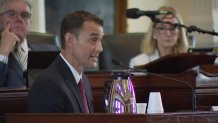
5:43 p.m., Bangert said the charity was taking justifiable legal positions and was requesting books and records from World Class concerning the investments the charity had made and World Class was refusing to provide those, which he said was improper.
5:42 p.m., Bangert said Paxton was determined for the office to intervene and the basis was that the charity was doing wrong to World Class. Bangert said he and Godbey were both resistant to intervening and thought that doing so was a poor choice.
5:41 p.m., Bangert said it was his determination there was no basis to intervene in the lawsuit. Bangert said Paxton was not happy with that response. "He informed me that he was surprised and not happy that we had waived. He wanted me to reconsider the waiver. He informed me that in his view it was improper for a charity to be oppressing a business, especially when the charity was effectively a limited investor in the business. He thought that was out of bounds for a charity to do that. It was his view that litigation was a form of oppression by the charity toward the business."
5:38 p.m., Bangert said he reached out to Joshua Godbey who he said oversaw the agency's financial litigation division to help him evaluate the request because it was his division that would have primary responsibility over the decision to intervene. Bangert said he learned from Godbey that the agency had already waived the case months before, deciding not to intervene.
5:36 p.m., Bangert said he was becoming increasingly concerned about the office's dealings with Nate Paul which began with the uncharacteristic decision on open records and had metastasized to a new section within the AG's office that had nothing to do with open records.
5:35 p.m., Bangert said Paxton came to his office and asked him to review the Mitte/World Class Holdings lawsuit and consider if there was a basis for the office to intervene pursuant to their statutory authority. Bangert previously said the attorney general's office is to intervene to advance the public interest in charities and that it's not characteristic to intervene to assist a party in particular. Bangert said the office should not intervene to aid a party seeking to harm a charity.
5:34 p.m., Bangert said it's within the attorney general's office purview to investigate charities and make sure that the charities are working to serve the public interest.
5:32 p.m. Says toward the end of May or beginning of June the attorney general approached him personally to review a pending lawsuit between the Mitte Foundation and World Class Holdings, the latter he said which was Nate Paul's company.
5:31 p.m. Bangert said the office was evaluating options for responding to the open records request. Bangert said he felt it would have been "unconscionable" to do a "pour out" due to the reasons he discussed and said the law enforcement exception has very strong public policy grounding in the state. The office decided to issue a "no decision" on the reconsideration request that Bangert said he believed was beneficial to Nate Paul.
"It was the best answer we could reach that we knew would be accepted by the attorney general at the time, even though I believed it was wrong," Bangert said. "In effect, our 'no decision' contravened our existing policy."
Bangert said because the office is the authority on open records decisions and because they issued a "no decision" on the reconsideration request, which was contrary to the office's precedent, it's a signal to the court about the attorney general's view of that file that they would have gone out of their way "to render a vastly uncharacteristic decision."
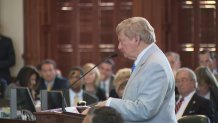
5:27 p.m. "The summary of it was, he was desirous of finding a way to either disclose that information or at the very least not rule against the requestor," Bangert said.
5:25 p.m., Bangert said there are two options with a records request, sustain the request for exemptions or do a "pour out" where you release the information. "It was clear to us that the attorney general was now stridently in favor of finding a way to disclose the information," Bangert said.
5:19 p.m., Bangert said Mateer had no interest in ever becoming attorney general and was considering leaving public service. Asked to rank the interest from 1-10, Bangert said Mateer's interest would be zero.
5:15 p.m., Court resumes.
4:50 p.m., Patrick calls for a 20-minute recess.
4:42 p.m., Bangert said it was unusual that the attorney general would involve himself in an open records request, but that he wanted to honor and fulfill the request and very quickly reached the decision that the decision was correct and that he advised the attorney general as such.
4:36 p.m., Bangert said he looked into Nate Paul. "I learned through my Google research that Mr. Paul had indeed been, his home and several properties had been searched by the FBI. That he was under active investigation by federal law enforcement. As someone who is a senior staff member, that immediately sends up red flags when you're being asked to review a file for reconsideration to disclose law enforcement materials to someone who is under an active and very far-reaching investigation."
4:24 p.m. Bangert said the attorney general asked him to look into an open records request. The request was a reconsideration of a previously considered open records request. Bangert said reconsideration requests were almost always denied.
4:13 p.m., Bangert, 46, described himself as a conservative Republican Christian. He said he attended Oral Roberts University for his undergrad and finished first in his law school class at SMU. At 28, he clerked for Judge Patrick Higginbotham for the United States Court of Appeals for the Fifth Circuit.
4:09 p.m., Hardin calls the prosecution's second witness, whistleblower Ryan Bangert who was deputy first assistant attorney general under Paxton.
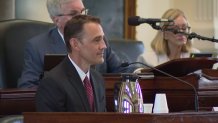
4:08 p.m., Buzbee passed the witness and Mateer was excused and subject to recall.
3:55 p.m., Buzbee begins recross of Mateer. He addressed Universal Time, the language in Article I of the articles of impeachment and whether there was a conflict of interest in hiring Sutton in an individual capacity while considering him for a contract position.
3:48 p.m., Hardin addressed an email brought up by Buzbee which showed it was sent at 1:39 a.m. Mateer questioned the time since he'd normally be asleep, but Hardin said that it was Universal Time, not Central Time and that it would have been 8:39 p.m. CT.
3:47 p.m., Mateer said they never started the memo process to pay Johnny Sutton and there was never any attempt to pay Sutton with agency funds.
3:43 p.m., Prosecutor Rusty Hardin begins redirection of Jeff Mateer.
3:41 p.m., Buzbee passed the witness back to the prosecution.
3:36 p.m., Mateer said he hired Johnny Sutton, in his individual capacity, during his last week with the attorney general's office, before he resigned and before he went to the FBI. Buzbee questioned Mateer about Sutton representing himself individually and the AG's office, but Mateer said Sutton was never hired by the agency and no money was paid to him.
3:28 p.m., Buzbee asks Mateer if he was staging a coup.
"You were involved in staging a coup weren't you?" Buzbee said.
"Absolutely not," Mateer said.
3:27 p.m., Buzbee questions Mateer about signing a letter coming from the AG's office where Paxton's name had been removed from the letterhead. Mateer said he didn't remove Paxton's name and didn't know who did it.
3:22 p.m., Mateer agrees with Buzbee that letters sent from the Office of the Attorney General are official documents.
3:20 p.m., Buzbee continues questioning Mateer about allocating $50,000 in unobligated reserve funds for outside counsel. Mateer said they wanted to meet with Ken Paxton on Oct. 1 but that he didn't meet with them.
3:15 p.m., The hearing resumed.
3 p.m., Patrick ordered a 10-minute recess.
2:52 p.m., The dialogue between Buzbee and Mateer got heated when the defense asked Mateer what authority he had to allocate $50,000 for outside counsel for the AG's office, to pay attorney Johnny Sutton.
Mateer said they ultimately didn't proceed and there was no signed contract.
Mateer to Buzbee: Can I finish? Are you done?
Buzbee to Mateer: Yeah, I know you're getting excited just let me finish.
Mateer to Buzbee: No I am, because this is .. you're trying to mistake things.
Buzbee to Mateer: Please.
Patrick to both: Settle down here. Just answer the question.
Hardin then objected saying Buzbee had no foundation and that he was making fun of the witness and testifying and not asking questions.
Buzbee asked, "What authority did you have to secretly go behind your boss's back and allocate $50,000 for outside counsel contract? What authority? Who gave you that authority?"
Mateer replied, "I can't answer that question because what you said is absolutely incorrect. First off, sir, I asked, we asked, to meet with the attorney general on this date. If we'd had a meeting, had he come, had he been here, we could have had a discussion. And perhaps, Mr. Sutton could have assisted even him at this point."
2:46 p.m., Buzbee offered into evidence, the second criminal complaint filed by Nate Paul which he said showed the nature of Paul's complaints and was the genesis for the second referral from the DA's office.
2:38 p.m., Prosecutor Rusty Hardin objected, questioning whether the origin of the document was from one of the whistleblowers. Buzbee asserted it was created by Ryan Bangert.
2:34 p.m., Buzbee asked Mateer if he was aware whistleblower Ryan Bangert was working on a draft of a letter to be sent to the FBI or the Texas Rangers, on behalf of the whistleblowers, and Mateer said he didn't remember. Buzbee said a draft was found on computers in the office.
1:40 p.m., Buzbee called into question the timing of a text sent from Mateer to Paxton and a letter signed by whistleblowers to George P. Bush, who ran against Paxton in 2022, asking on Oct. 1, 2020, that his law license be reactivated after 10 years.
1:37 p.m., Lunch recess ends and Buzbee continues his cross-examination of whistleblower Jeff Mateer.
12:42 p.m., Court is in recess for lunch until 1:30 p.m.
12:28 p.m., Buzbee asked Mateer, "Is it possible, Mr. Mateer, that you jumped to a lot of conclusions really fast?"
Mateer replied, "I don't think so, sir."
"You could have put all of this to bed if you had just talked to your boss," Buzbee said.
Mateer said he attempted to talk to Paxton beginning in June, July, August and September. Buzbee said, "No," prompting Mateer to raise his voice and say, "I did! I did talk to him, sir." Before looking toward the defendant's table and saying, "Oh, he's not here."
12:25 p.m., Buzbee said in 2018 Paxton raised $6.7 million in donations. He said Nate Paul donated $25,000 which was .37% of all donations Paxton received that year.
12:07 p.m., Asked to describe the good faith belief of a crime that led him to talk with the FBI about Ken Paxton, Mateer said, "I believed that he potentially could have been subject to blackmail and as a result, he was taking illegal actions on behalf of what we then knew was a campaign donor but he was taking actions on behalf of Mr. Paul. At one point I actually believed he was being blackmailed, sir."
Mateer said he made reasonable assumptions before reporting his concerns to the FBI.
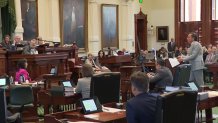
12:05 p.m., Buzbee said journals were found in Mateer's office after he resigned. The journals were dated from January 2018 through June 2020. Mateer said when he stopped writing notes he had transitioned to using the software One Note on an iPad. Mateer said those electronic notes should still be in the custody of the Office of the Attorney General. Buzbee accused Mateer of deleting them and Mateer said he wouldn't know how.
11:57 a.m., Buzbee said it has been three years since Mateer went to the FBI and noted that there have been no federal indictments coming from the information they brought forth, information Buzbee said was the basis for the impeachment hearing.
11:52 a.m., Buzbee asks if Mateer was authorized as first assistant to remove the attorney general's name from letterhead. Mateer said he didn't recall removing Paxton's name from correspondence. Buzbee asked if it was illegal and Mateer said he didn't think it was illegal.
11:49 a.m., Though Mateer didn't keep texts, Buzbee said others did produce texts involving Mateer and he presented those to the court. Buzbee then read a text sent from Mateer on Sept. 29, 2020, saying, "We have a major problem. The kid has served a subpoena on a bank. Showed up there in person at the bank." Mateer said at the time he didn't know Cammack had a second referral.
11:47 a.m., Buzbee asked Mateer if he ever saw the attorney general with a burner phone or with a secret email address. Mateer said he saw Paxton had several phones and a Proton email address. Buzbee asked why people use a Proton address and Mateer said it was because they were concerned their emails were being monitored by Google while investigating Google. Buzbee also asked if was to protect emails when traveling to China and Mateer agreed.
11:45 a.m., Mateer said he had a zero-inbox policy and that he would delete texts or emails almost in real time if they didn't require follow-up action.
11:42 a.m., Buzbee asserted instead of going to the FBI, Mateer could have called Paxton and asked why Brandon Cammack was sending subpoenas to a bank and that if he had he would have learned about a second referral from the DA's office.
11:41 a.m., Defense attorney Tony Buzbee begins cross-examination of Jeff Mateer. Buzbee began by questioning whether Mateer and Paxton were friends and if going to the FBI was a way he would protect his friends from themselves.
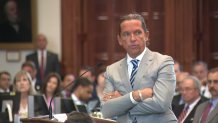
11:21 a.m., Prosecution passes the witness to the defense and Dan Patrick orders a 10-minute recess.
11:16 a.m., Mateer said he resigned on Oct. 2. He said by Sept. 29, "I concluded Mr. Paxton was engaged in conduct that was immoral, unethical and I had a good faith belief that it was illegal." Mateer said they went to the FBI the next day. "I knew by that time that my tenure as first assistant was coming to a quick end. I knew that there would be, anytime someone stands up that there could be consequences so I knew I was in the process of leaving the office."
11:12 a.m., Mateer describes the emotional meeting when Ken Paxton and Angela Paxton told senior staff and campaign staff about his affair. Mateer said Paxton asked for forgiveness and said the meeting was very emotional. "Mr. Paxton apologized and, using Christian terminology I would say he repented. I know that's a Christian term but from my perspective, that's what I believed," Mateer said. The witness said Paxton said the affair was over but that they later learned that it wasn't and that the woman had been hired by Nate Paul.
"Because it answered one of the questions that I kept struggling with is, 'Why would General Paxton jeopardize all this great work that we had been doing in the Office of the Attorney General? Why would he be engaged in these activities on behalf of one person?' All these different things. By this time we knew he had hired Mr. Cammack. Why would he do this against his advice of the people who he trusted to run his office, including me? It answered that 'Why?' question."
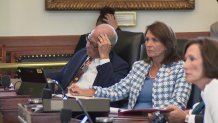
10:45 a.m., Mateer said during a subsequent meeting with Paxton on other cases the attorney general was as friendly as he'd ever been and that "it was the Ken Paxton that I'd known for four-plus years. Very friendly, very communicative. I was actually surprised by that because our last discussion had been so heated."
10:42 a.m., Mateer said he again asked the attorney general, of Nate Paul, "'Ken, why are we involved in this? What?' It just didn't make sense to me of all the things going on, why were we involved in this," Mateer said. Mateer said by the end of September 2020, the office had learned a lot more about Nate Paul and what was being alleged against him. Said they knew at that time that Paxton wanted to appear in court on his behalf at that he had been pressuring deputies and line lawyers to do more on behalf of Nate Paul. Said Mark Penley, who was deputy attorney general for criminal justice, wanted to investigate Paxton. Mateer said Penley is honest to a fault and that bells and whistles went off when Paxton said on a call that Penley was lying.
10:39 a.m., Mateer talked about a heated conversation with Paxton on Sept. 25 over the hiring of Brandon Cammack where the attorney general allegedly said Mateer approved the hiring. "I said, 'Absolutely not.' I never approved the hiring of Mr. Cammack. I think it's probably the first time ever I raised my voice to the attorney general in response to him raising his voice to me."
In Article 5 of the articles of impeachment, Paxton is accused of misusing official powers by hiring attorney Brandon Cammack to investigate a baseless complaint made by Paul. That led to Cammack issuing more than 30 grand jury subpoenas in an effort to help Paul.
10:18 a.m., Defense attorney Tony Buzbee objected, saying prosecutor Rusty Hardin was leading the witness when he asked Mateer if Paxton helped Nate Paul by directing an opinion on foreclosures that was totally contrary to his administration's policy and his own public statements. Hardin restated the question and Mateer said the opinion issued by the office was contrary to what he believed Paxton believed and what had been the policy of the office.
10:15 a.m., Said in early August 2020 he'd learned the office had issued an opinion letter with regard to foreclosures. Said the office had been at the forefront to stop COVID restrictions and to reopen the state amid the pandemic and that the letter was in contrast to that. "The opinion took the complete opposite view. It was as if Anthony Fauci had written it," Mateer said.
10:12 a.m., Despite an objection from defense attorney Tony Buzbee, Mateer read to the jury the memo he wrote about concerns over Paxton's personal involvement in matters related to Nate Paul and his companies. In the memo, Mateer said Paxton agreed that going forward he would not have any personal involvement with any matters the office is handling with regard to Paul or his companies.
10:10 a.m. Mateer said he wanted a meeting with Paxton to discuss why he was involving himself in the affairs of Nate Paul and why the attorney general felt like he had to go to Travis County court on behalf of someone. Mateer said the meeting request reiterated concerns that he said he and the senior staff had with Paxton being involved with Paul and his companies.
10:03 a.m., Jeff Mateer was called back to the witness stand.

9:56 a.m. Defense attorney Tony Buzbee said Ken Paxton has nothing to hide and that they were withdrawing their objection from Tuesday on the issue of privilege. Buzbee said he'll still address hearsay, but that they would not make a privilege objection in the trial.
9:49 a.m. It was announced that the House managers and the defense team came to an agreement on exhibits. Jennifer Brevorka, a partner at Rusty Hardin & Associates, read a list of exhibits to be pre-admitted into evidence.
9:46 a.m., Ken Paxton, who is not required to attend all of the proceedings, was not seen in the courtroom Wednesday morning.
9:45 a.m., The Senate was called to session and Lt. Gov. Dan Patrick entered the chamber. The jury was then called into the chamber.
DAY 1 SUMMARY
Day 1 ended abruptly during the questioning of former First Assistant Attorney General of Texas Jeff Mateer.
Mateer was Paxton's former number two man and is a longtime conservative lawyer who is now working at a religious liberty law firm. Mateer was questioned about Nate Paul asking the attorney general's office for help after feeling like he was being unfairly targeted in an FBI investigation (Paul was indicted over the summer on charges of making false statements to a bank to secure more than $170 million loans). Mateer said he thought it was very strange that with hundreds of attorneys working in the AG's office Ken Paxton wanted to personally argue such a specific case.
As prosecutor Rusty Hardin moved to introduce evidence during questioning, an objection by the defense over the pre-admitted evidence derailed the hearing. The defense said the evidence should never have been admitted because it was privileged information, the prosecution said it was evidence submitted for pre-approval by the defense.
Patrick who is serving as the judge in the court of impeachment, said late Tuesday afternoon that they would clear up any issues with pre-admitted evidence and answer questions about privilege before the trial resumes Wednesday.
Before the questioning began and before the opening statements were read Tuesday, Patrick led the jury of Texas Senators through 16 pre-trial motions filed by Paxton aiming to dismiss some or all of the articles of impeachment. All of the motions were denied. Patrick decided on another eight, denying seven and granting one -- that the general not be forced to take the stand to testify in his own defense.
Meanwhile, it's unclear if the suspended attorney general will return to the courtroom on Wednesday. Paxton left Tuesday's hearing during the lunch break, after entering 16 pleas of "not guilty."
WHY IS PAXTON ON TRIAL?
The Republican-led Texas House of Representatives voted overwhelmingly in May to impeach the attorney general, largely based on his former deputies' claims that he used his power to help a wealthy donor who reciprocated with favors including hiring a woman with whom Paxton had an extramarital affair. The 20 articles of impeachment brought forth by the Texas House include allegations of abuse of public trust, unfitness for office and bribery. The Texas Senate is holding four of the articles in abeyance because they are largely related to the 2015 criminal charges where Paxton has been accused of felony securities fraud. Paxton has pleaded not guilty in that case but so far there has been no trial.
If convicted in the impeachment, Paxton would be removed as attorney general and could be barred from holding future elected office in the state.
THE LATEST IN THE KEN PAXTON IMPEACHMENT TRIAL
Below are some of the headlines from the historic nine-day impeachment trial.
KEN PAXTON IMPEACHMENT TRIAL
What to know about the historic impeachment of Texas Attorney General Ken Paxton.

